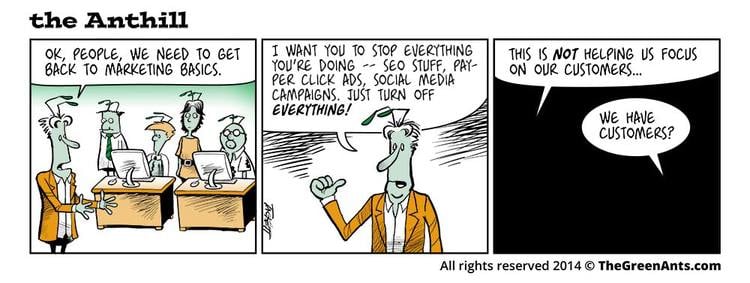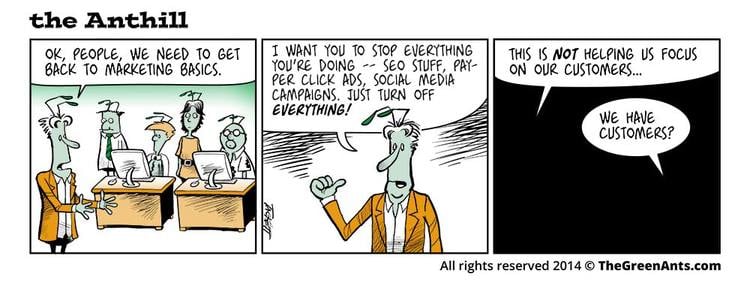It happens almost all the time. I’m interviewing someone for a marketing position. And within the first 10 minutes, he or she asks: “How big is your marketing budget?”
It’s completely the wrong question.
In a job interview, especially if it’s for a marketing job, you should be trying to display your qualifications and experience to the interviewer (me, in this case). I want to hear about your added value, your creative thinking, your knowledge of my company’s customers—or at least, your desire to understand my company’s customers.
When you ask upfront how big is the marketing budget, this is what I hear: “How can I spend my way to achieving your marketing objectives?”
I’m not against spending money on marketing or advertising. And a candidate for a marketing job is naturally going to want to know what the financial boundaries might be.
But the question, especially when asked so quickly into an interview, is symptomatic of a larger problem I’ve noticed. In short: Marketing today has become more about tools and data and less about knowing the customer.
It’s Time for a Cultural Shift
We’ve reached the point where it’s time for a cultural shift in marketing. We need to turn our outbound marketers, who’ve been busy creating noisy ad campaigns and orchestrating events where people show up for the free food and not the ideas being presented, into savvy, digital inbound marketers—people who will actually listen to you and who care about helping your company achieve its goals.
So how do you make a cultural shift like this? For starters, you should stop your marketing team from doing pay-per-click, Facebook and other ads. Put a halt to your content marketing program. Now.
This probably sounds crazy, I realize. But hear me out. Here’s why I suggest taking such drastic action.
We’ve Become Too Obsessed With Tools
Over the past 20 years, as digital marketing tools have exploded on the scene, marketers have found many ways to ‘make noise,’ to replicate what others are doing, to scale their marketing campaigns easily. It’s become second nature to rely on tools. And it’s made us a little lazy. Because our marketing tools give us lots of shortcuts, we’ve become focused on trying to do a lot of little things at once instead of doing one thing really well.
There’s too much emphasis on gaming the system and hacking your way to growth through digital marketing. Consider search engine optimization (SEO), for example. The fact that we even have a discipline called SEO is itself indicative of the problem.
For too long, many marketers have focused on what Google searchers are typing into the query box. They’re determined to make sure their company or client shows up at the top of search results for relevant queries. They bought links from dubious directories and websites and pushed out dubious content in hopes of attracting more links.
For a while, their efforts might have worked—until Google started significantly updating its algorithm and began pushing the dubious SEO stuff way down in search results. Google has also become extremely good at recognizing who has the most relevant answer to the question being asked.
While we were busy spinning all those SEO wheels for fleeting benefits (and perhaps subsequent penalties), we’ve lost sight of the fundamental concerns marketers should address. Namely: Who are the people we’re trying to reach, exactly? What are their pain points, needs, and interests? What are they searching for on Google? Why are they searching for it? And what do they hope to find?
SEO isn’t the entire problem, of course. There’s an urgent rush to get out the marketing message right this minute using whatever means are at your disposal: pay-per-click (PPC) ads, Facebook ads, social media campaigns, and so on.
Granted, each of these marketing tactics can be extremely helpful—if you have a great product that solves a real problem your customers have, and if you’ve done the research and the hard work to create that product or service. Then, and only then, does it makes sense to spend money on marketing that product. If you don’t, few people will know about it or experience its benefits, and all the hard work going into developing the product or service will have been for naught.
And yet...
We Need to Get Back to Marketing Basics
I’m not talking about a return of the Madison Avenue of the 1960s and 1970s, where marketing and advertising were all about ‘spray and pray’—trying to reach as many eyeballs as possible.
I’m talking about:
- Doing your market research.
- Knowing who your target customers are and developing your customer personas.
- Finding out what your customers want.
- Testing your assumptions about what customers want.
- Building the product/service.
- Getting target customers to try the product/service and asking for their feedback.
- Revising the product/service as needed.
- Once you’ve done all that work—and it is hard work—then it’s time to build your marketing plan.
These are basics that aren’t emphasized as much as they should be in marketing classrooms today, because we’ve all become so enamored with the easy solutions that online tools give us.
Hit the Brakes Now
If you haven’t followed that sequence of events, then you’re probably wasting your marketing efforts.
The only way to turn the ship around is to stop what your marketing team is doing right now. Pause the PPC campaigns. Hit the brakes on organic SEO efforts. Jump off the content marketing bandwagon. Don’t let your team spend any more time or money on these things until they thoroughly understand everything they can about your customers: Who they are, what they need, why they need it, and what they don’t need.
Once you do all these things, your marketing efforts going forward will be much more effective. Your content marketing efforts will attract links. Links will help your organic SEO rankings. Your PPC ads will hit a nerve with target customers. You’ll get the desired effect: better leads, more conversions, and higher revenues.
If nothing else, at least now you’ll know which questions to ask-and not ask—in your next marketing job interview!

